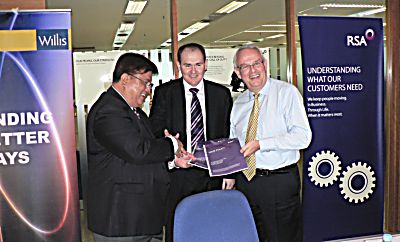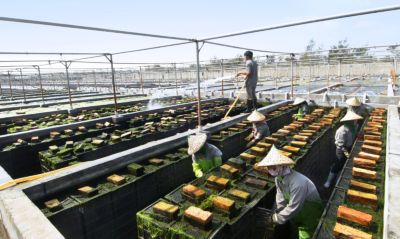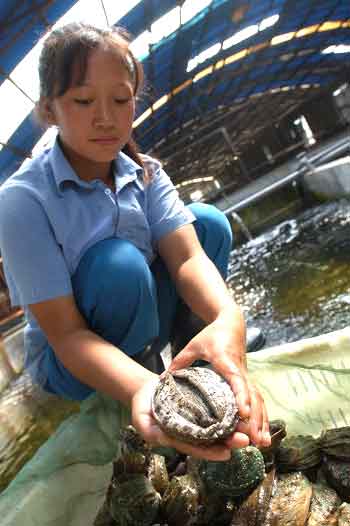
OCEANUS chairman Dr Ng Cher Yew is confident about something that investors aren’t - that the risk of widespread disease at Oceanus’ abalone farms is very remote.
A former veterinarian, Dr Ng is sure that the processes and management systems in place at the farms minimize the risk of disease.
Still, Singapore-listed Oceanus - the only listed abalone company in the world - has decided to addresses the concerns of investors head-on.
From yesterday (Dec 1), Oceanus has obtained insurance coverage for up to 50% of the market value (RMB 383 million as at end-Sept) of its abalones.
The insurer which will cover Oceanus against not only diseases but also natural disasters and theft is China Fishery Mutual Insurance Association, and the reinsurer is RSA Group.
RSA is a global insurance group serving over 20 million clients worldwide with its 22,000 staff.
Mr David Oldham, Business Manager (International Marine) of RSA, said in a press release: “The technical visits to the (Oceanus) farms in Fujian have been a critical part of the underwriting process as this has allowed us to develop a high level of appreciation about how Oceanus operates. We are impressed with the production process of abalones in Oceanus farms.
“We are able to easily assess the quantity and health of the livestock and gauge the risks involved in the rearing process and we conclude with a high degree of certainty that Oceanus has put in place very good risk management measures in protecting and safeguarding its biological assets.”

Q: Why insure up to 50% of the market value?
Dr Ng: Oceanus’ farms are located over 250 km, which reduces the risk to Oceanus of a disease spreading far and wide.
In addition, since the insured value includes the abalone cost and profit, there is no need to insure, say, 100% of the market value. The market value is a moving target, as Oceanus’ abalone population grows. As at end-Sept, it stood at 172 million abalones.
Q: What is the prevalence of disease among abalone farms in the past?
Dr Ng: Any outbreak anywhere does not necessarily translate into a possibility in our case. Disease can happen in a farm that’s not well managed, in an area where the resources are against them.
If you read reports that have come out in the past regarding mortality rates, you have to ask yourself: What is the cause? The Taiwan outbreak in 2006-2007 was due to inbreeding. Nothing to do with disease. In the case of Australia, the cause was viral infection at sea.
Such risks are very remote in our case because:
a) We do very strong genetic management, so we don’t have inbreeding.
b) We choose sites and areas that allow us to have one-way flow of water, tanks that are separated, etc.
Let me give you a parallel: If a small factory catches fire, how likely will a huge, well-run factory have the same problem? Very remote.
Q: What’s the premium for the insurance?
Dr Ng: We will announce it in our financial results statement in due course. The premium is a quarterly payment.

Dr Ng: As a good farm manager, we don’t have the same worry that an investor has. Since investors are not as believing and knowledgeable as us, we want the insurance to remove
a concern they have.
What’s also important is, an insurer is more conservative in nature than an investor. Here are specialists who insure you for big sums of money, they are even more conservative.
For them to say yes, we will insure you, it’s a reflection on us, our management, our methodology. It’s like an accreditation. It gives comfort to our investors – that’s important.
Q: What can you say about the safety and hygiene of abalone farms?
Dr Ng: A lot of small farms are obviously not insurable. They don’t have control over their environment. They don’t have systems and processes in place.
Q: What about theft, and the risk of truckloads of your abalone being stolen while on the move?
Dr Ng: If you take away 1,000 abalones, it is a small percentage of our assets! We have security measures such as banning entry into the production areas after 6 pm when work ceases. Only designated managers are allowed there. At night, we release over 100 dogs in our farms, which are bounded by walls. There are no lights in the farm at night, so how can you steal abalones in pitch darkness? You will fall into the abalone tanks!
Q: How many workers do you have?
Dr Ng: The number changes with the production … now it’s about 800.
Q: Is Oceanus the first abalone company to be insured?
Dr Ng: We are probably the second aquaculture company in China to be insured. We are the first foreign company to be insured in China, and the first to be covered by Chinese insurance which is reinsured by an international insurer.
Willis Group Holdings, the broker who arranged the insurance, and RSA, are very good in aquaculture insurance. They can tailor policies to meet your special needs because they understand aquaculture very well.
Q: Why the reinsurance outside China?
Dr Ng: We are a non-Chinese company. We are a Singapore listco with Chinese assets.
Q: I suppose some abalone farms in places such as New Zealand and Australia would be insured.
Dr Ng: I can safely say at least 90% are not insured. They are mainly small companies owned by families.
Q: What is the trend of abalone prices in China in this current economic environment?
Dr Ng: Now we are approaching Chinese New Year, so the price is stable. Next year, the price could trend slightly downward because of the economic recession.





